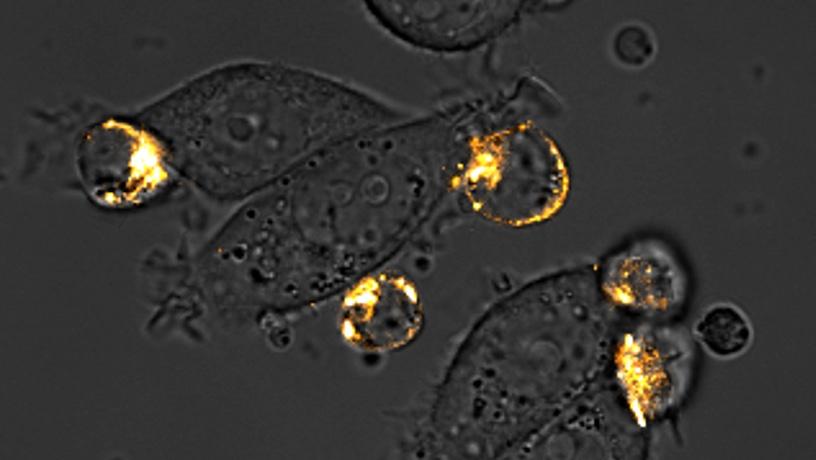2023-10-12 コロンビア大学

Microscopy image of CAR-T cells attacking ‘painted’ breast cancer cells. Credit: Rosa Vincent and Thomas Savage/Columbia Engineering
◆彼らは腫瘍に居住する細菌(プロバイオティクス)を遺伝子組み換えし、腫瘍に合成標的を生成させ、CAR-T細胞に新たに浮き上がったがん細胞を破壊させるように導きました。
◆このプロバイオティクスガイドのCAR-T細胞プラットフォームにより、従来のCAR-T療法が成功するのが難しかった固形腫瘍への治療が可能となり、特定の腫瘍抗原を特定する必要がなくなります。このアプローチは多くのがんの治療に大きな影響を与える可能性があります。
<関連情報>
- https://www.engineering.columbia.edu/news/engineered-bacteria-paint-targets-tumors-for-cancer-killing-t-cells-to-see
- https://www.science.org/doi/10.1126/science.add7034
固形腫瘍を標的とするプロバイオティクス誘導CAR-T細胞 Probiotic-guided CAR-T cells for solid tumor targeting
Rosa L. Vincent,Candice R. Gurbatri,Fangda Li,Ana Vardoshvili,Courtney Coker,Jongwon Im,Edward R. Ballister,Mathieu Rouanne,Thomas Savage,Kenia de los Santos-Alexis,Andrew Redenti,Leonie Brockmann,Meghna Komaranchath,Nicholas Arpaia,and Tal Danino
Science Published:12 Oct 2023
DOI:https://doi.org/10.1126/science.add7034
Editor’s summary
Immunotherapy has proven highly efficacious for certain types of blood cancers, but the lower success rates for solid tumors remain a challenge. Vincent et al. designed probiotics that could home in and colonize solid tumors to improve chimeric antigen receptor (CAR) T cell immunotherapy. The two-step approach involved engineering a nonpathogenic strain of Escherichia coli, which delivered synthetic antigens to the tumor microenvironment and “tagged” the tumor (see the Perspective by Bressler and Wong). They next generated CAR T cells that were programmed to recognize these synthetic antigen tags. When the E. coli probiotic was administered, the CAR T cells could be directed to the solid tumors, where they orchestrated tumor cell killing in experimental models of breast and colon cancer. —Priscilla N. Kelly
Abstract
A major challenge facing tumor-antigen targeting therapies such as chimeric antigen receptor (CAR)–T cells is the identification of suitable targets that are specifically and uniformly expressed on heterogeneous solid tumors. By contrast, certain species of bacteria selectively colonize immune-privileged tumor cores and can be engineered as antigen-independent platforms for therapeutic delivery. To bridge these approaches, we developed a platform of probiotic-guided CAR-T cells (ProCARs), in which tumor-colonizing probiotics release synthetic targets that label tumor tissue for CAR-mediated lysis in situ. This system demonstrated CAR-T cell activation and antigen-agnostic cell lysis that was safe and effective in multiple xenograft and syngeneic models of human and mouse cancers. We further engineered multifunctional probiotics that co-release chemokines to enhance CAR-T cell recruitment and therapeutic response.


